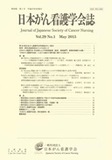Japanese
English
- 販売していません
- Abstract 文献概要
- 参考文献 Reference
- サイト内被引用 Cited by
要旨
目的:続発性リンパ浮腫は,リンパ節郭清を伴う婦人科がん手術によって引き起こされる後遺症であり,これを予防する予防教育が注目されている.本研究は予防教育で,リンパ浮腫の発症を予防するには生涯を通じてセルフケア継続が必要と説明されたとき,どのような思いを抱くのかを明らかにする.
方法:婦人科がん手術後に実施するリンパ浮腫予防教室受講後に同意を得られた研究協力者に半構造化面接法を行い,質的帰納的に分析を行った.
結果:研究協力者は30歳代から60歳代の女性15名であった.面接内容から,最終的に【終わりのないセルフケアは重荷】【セルフケアと継続性の不確かさ】【セルフケアは必要と自分に言い聞かす】【具体的にやらなきゃいけないセルフケア】という4つのカテゴリを抽出した.
考察および結論:【終わりのないセルフケアは重荷】【セルフケアと継続性の不確かさ】の2つのカテゴリは自覚症状がないままに続くケアの重荷という予後の不確かさと確証のないケアと自身の継続性につながる医療の不確かさという認知であった.これらの不確かさの評価が【セルフケアは必要と自分に言い聞かす】【具体的にやらなきゃいけないセルフケア】というこれから行う具体的なセルフケアへと思考を発展させていく思いとなっていた.このことは,医療者がリンパ浮腫未発症者のセルフケアへの思考の喚起と実践につながる支援法の開発を示唆するものである.
【Purpose】Secondary lower limb lymphedema (SLLL) is a serious complication caused by lymphadenectomies occurring with gynecological cancer. SLLL preventive education has garnered attention in recent years. The present study fills a gap through a qualitative analysis of the impressions of women who were educated about the importance of continued lifelong self-care.
【Method】Semi-structured interviews were conducted following a lymphedema prevention class at a gynecological ward. Interview data was qualitatively analyzed using an inductive approach. This study was approved by our own Ethical Committee.
【Finding】Fifteen patients aged from their thirties to sixties participated in the study. Four primary categories emerged from the analysis. The four primary categories are as follows, “The burden of continuing lifelong self-care,” “Uncertainty about one's ability to sustain self-care behaviors and whether it was even possible to do so,” “Persuading oneself to engage in continued self-care,” and “Thinking about practicable self-care in SLLL prevention.”
【Discussion & Conclusions】The category “The burden of continuing lifelong self-care”, means “prognosis uncertainty.” The other category, “Uncertainty about one's ability to sustain self-care behaviors and whether it was even possible to do so,” means “medical uncertainty.” The patients evaluated two uncertainties and began thinking of engaging in self-care to prevent SLLL. These results suggest the necessity for healthcare professionals to acknowledge the uncertainty gynecological cancer survivors face and to support them in taking the lead with regard to thinking about and incorporating self-care into their daily lives.
Copyright © 2015, Japanese Society of Cancer Nursing All rights reserved.


